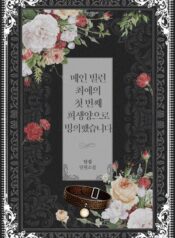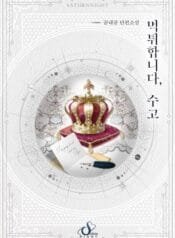This time, it probably wouldn’t be anything important either.
However, despite his intention to act indifferent, his curiosity was evident from the hurried way he removed the sealing wax.
Siegel couldn’t stop praising how Hazel was becoming more mature by the day. To Leopold, though, it all felt rather abstract. He couldn’t directly experience Hazel’s manner of speaking or behavior. Perhaps he could catch a glimpse of her through the letters.
Behind the broken seal were two sheets of paper. He quickly read through the letter.
“Dear Duke Leopold Lawrence,
Hello, Duke. This is Hazel. It feels strange to ask how you are doing in a letter to Mrs. Lawrence, so I decided to write separately. I’ve already read fifty books. Impressive, right? Some are thin, and others are thick.
Yesterday, I was praised by my teacher. They said I have excellent magical power. I still don’t really know what I can do with this power. Do you know, Duke? If so, please tell me.
And now that I’m a year older, I’ll study even harder. I heard from the headmaster that you were a good student. Is that true? I’m curious.
Thank you for always taking care of me.
Sincerely, Hazel.”
Aside from the increasingly neat handwriting, it was still a letter filled with childish banter. It had been almost a year since she started school, yet she still didn’t know how to properly use formal language. Didn’t they teach etiquette at school? He clicked his tongue several times.
Then he fell into thought. Should he respond? Reading fifty books is impressive, magical power is the ability to heal the sick, and you’ll soon realize it, I really was a good student…
As he internally answered her questions one by one, he let out a hollow laugh. There was no need to respond to such trivial matters, especially when he was already busy addressing the grievances raised by the people of his domain.
“What will you do about the reply?”
“No need,” he replied with a dismissive snort, indicating he wouldn’t bother with trivial matters. Unfortunately, Siegel wasn’t perceptive enough to catch the subtle nuance in his tone.
From the day the third letter arrived, they began to have meals together regularly. Because of this, Siegel seemed to think he had become quite close to Duke Lawrence. His lengthy conversations about the academy and Hazel during meal times were proof of that.
Still, the topics about the academy were worth listening to. As a sponsor, he needed to ensure there were no inconveniences in nurturing talent. The general renovation of the dormitory building and the installation of garden benches with canopies were actually suggestions made by Siegel.
The problem was that there were more stories about Hazel than productive discussions.
Running around like a rascal and taking a big fall, boasting loudly about getting a perfect score, overeating and getting indigestion, whispering to Siegel about missing her younger sibling, being particularly afraid of thunder and lightning, and clinging to teachers on rainy days…
The details were so mundane and ordinary that it seemed odd to bring them up in conversation. Of course, he had never experienced any of those things himself.
Perhaps because of that, indescribable emotions welled up inside him.
You are alive.
Siegel wasn’t much of a storyteller, so Leopold had to inject his imagination between the words Siegel uttered. How she fell, how loudly she boasted, what she ate that caused indigestion, what expression she had when she said she missed her sibling, whether she clung to a teacher’s coat or asked to hold their hand…
The child who had been dying, covered in rags, gradually transformed in his mind into a healthy and cheerful girl. Leopold found this brightness strangely exhausting. Yet, he didn’t want to tell Siegel to stop.
“It would be nice if you could reply just once. Hazel always asks, you know. If there’s a reply…”
Every time he returned, Siegel would express his disappointment, but Leopold’s response remained unchanged.
“It’s not worth replying to.”
Annoyingly, the letters he thought would stop after a few exchanges continued to arrive. The phrase ‘Dear Duke Leopold Lawrence’ gradually weighed on his mind. To ease this discomfort, he sent Hazel the things she needed under the name of the Lawrence family, instead of writing back.
And then, that letter came.
“Dear Duke Leopold Lawrence,
Hello, Duke. This is Hazel. I have something to brag about. Do you know what it is? Mrs. Lawrence gifted me new clothes, shoes, and very luxurious stationery!…”
It was only natural for her to mistake the sender for his mother. It was more reasonable to imagine that a woman, rather than a man, would choose cute dresses and shoes for a child.
She devoted the entire letter to describing how wonderful, amazing, and delightful the gifts were, using words like splendid, bright, and luxurious, which didn’t quite match her age. She must have diligently looked them up in the dictionary. Her excitement was palpable even between the lines.
“…I’m so, so happy to receive the gifts. It’s because it means you thought of me! How about thinking of me, Duke? That would make me as happy as receiving the gifts!
I’ll write again next time. Goodbye.
Sincerely, Hazel.”
The thought that she’d be happy if he thought of her.
From what Siegel had told him, Hazel wasn’t the type to act cunningly. So, those words were likely sincere. Perhaps it was due to the memory of being abandoned.
Leopold had never received such an emotional request from anyone before. Moreover, he had never made anyone purely happy because of him…
He felt a strange churning inside.
What he had viewed merely as a child’s writing practice began to take on a different meaning. The thought that it would be nice if she were happy lingered in his mind.
As the seasons changed, as the years passed, and as her subjects of study increased, he sent her various gifts, both large and small. Most were necessities, but occasionally, he included something a bit luxurious. Hazel, no matter what it was, always expressed her joy and gratitude with unflagging enthusiasm. Of course, her letters to him were filled with admiration for Mrs. Lawrence’s excellent taste.
His mother, knowing well that he frequently sent gifts to Hazel, never mentioned it. Perhaps she liked being misunderstood, so Leopold didn’t bring it up either.
Hazel became increasingly chatty. Despite not receiving any replies, she seemed to have so much to say, filling her letters with trivial, everyday details as if writing a diary.
He naturally came to know Hazel.
Her favorite subjects, disliked foods, the name of her best friend, the teacher she respected the most, the title of a novel she enjoyed, and why she disliked the rain…
Whenever he felt engulfed by a bleak mood, he would invariably take out Hazel’s letters. Even though he knew all the contents and remembered every detail of the words, he lost track of time while reading. Occasionally, he felt a shiver as if she were speaking to him right beside him.
Why was that?
Was it because she was such a contrast to him? Like light and darkness, summer and winter, life and death. A stark contrast, a parallel existence he could never reach.
He wasn’t envious. He knew all too well that he was a person without any inherent value.
The frequency of the letters became increasingly erratic. Sometimes a new letter would arrive after three weeks, but other times there was no word for nearly half a year.
For someone whose life was otherwise unchanging, these irregular letters were a break from routine. Occasionally, Leopold found himself irritated.
Especially when he felt like he was waiting…
Yet, when a long-awaited letter finally arrived, thick with content, his irritation would often dissipate.
Until her coming-of-age ceremony, he cherished the few sheets of paper like a gripping novel he didn’t want to end. Still, when he reached the part that read “Sincerely, Hazel,” an unbearable emptiness would wash over him.
So, after reaching adulthood, he would open a bottle of strong liquor on the days a letter arrived. By the time he finished reading, he could rely on a pleasant buzz to help him fall asleep.
***
“As I talk, I realize how long I’ve held you in my heart. It’s foolish. To only realize this now.”
Leopold shook his head in self-mockery. However, I couldn’t bring myself to change my somber expression.
At the start of the story, I laughed at the thought of him being flustered by a letter full of spelling mistakes, and I was relieved that Uncle Siegel, who had gone through so much trouble delivering the letters, didn’t know their contents. But the cheerful parts ended there. Moreover, it was Leopold, not Mrs. Lawrence, who had sent the gifts. I should have asked who sent them at least once.
I hadn’t intended to drink because I was too tired, but I had no way to calm the emotions welling up inside. In the end, I picked up a glass.
“Don’t feel sorry for me. I’m fine. You’re here.”
Leopold spoke soothingly, as if I looked like I might cry at any moment. Overcome by his kindness, I couldn’t help but dab my eyes with the napkin on my lap.
“Hazel… why…”
You must be bewildered. You were simply recounting a past I didn’t know about with a calm heart.
Swallowing my trembling and tears, I slowly began to speak.
“I’m truly happy and grateful for your feelings… But I wonder if I have… somehow added to your loneliness…”
Leopold looked at me in surprise. As if questioning how I could think such a thing, he shook his head firmly.






